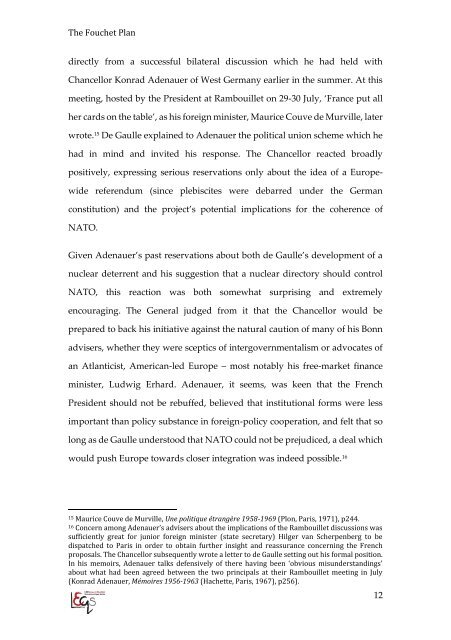The Fouchet Plan De Gaulle’s Intergovernmental Design for Europe
n?u=RePEc:eiq:eileqs:117&r=cdm
n?u=RePEc:eiq:eileqs:117&r=cdm
You also want an ePaper? Increase the reach of your titles
YUMPU automatically turns print PDFs into web optimized ePapers that Google loves.
<strong>The</strong> <strong>Fouchet</strong> <strong>Plan</strong><br />
directly from a successful bilateral discussion which he had held with<br />
Chancellor Konrad Adenauer of West Germany earlier in the summer. At this<br />
meeting, hosted by the President at Rambouillet on 29-30 July, ‘France put all<br />
her cards on the table’, as his <strong>for</strong>eign minister, Maurice Couve de Murville, later<br />
wrote. 15 <strong>De</strong> Gaulle explained to Adenauer the political union scheme which he<br />
had in mind and invited his response. <strong>The</strong> Chancellor reacted broadly<br />
positively, expressing serious reservations only about the idea of a <strong>Europe</strong>wide<br />
referendum (since plebiscites were debarred under the German<br />
constitution) and the project’s potential implications <strong>for</strong> the coherence of<br />
NATO.<br />
Given Adenauer’s past reservations about both de <strong>Gaulle’s</strong> development of a<br />
nuclear deterrent and his suggestion that a nuclear directory should control<br />
NATO, this reaction was both somewhat surprising and extremely<br />
encouraging. <strong>The</strong> General judged from it that the Chancellor would be<br />
prepared to back his initiative against the natural caution of many of his Bonn<br />
advisers, whether they were sceptics of intergovernmentalism or advocates of<br />
an Atlanticist, American-led <strong>Europe</strong> – most notably his free-market finance<br />
minister, Ludwig Erhard. Adenauer, it seems, was keen that the French<br />
President should not be rebuffed, believed that institutional <strong>for</strong>ms were less<br />
important than policy substance in <strong>for</strong>eign-policy cooperation, and felt that so<br />
long as de Gaulle understood that NATO could not be prejudiced, a deal which<br />
would push <strong>Europe</strong> towards closer integration was indeed possible. 16<br />
15 Maurice Couve de Murville, Une politique étrangère 1958-1969 (Plon, Paris, 1971), p244.<br />
16 Concern among Adenauer’s advisers about the implications of the Rambouillet discussions was<br />
sufficiently great <strong>for</strong> junior <strong>for</strong>eign minister (state secretary) Hilger van Scherpenberg to be<br />
dispatched to Paris in order to obtain further insight and reassurance concerning the French<br />
proposals. <strong>The</strong> Chancellor subsequently wrote a letter to de Gaulle setting out his <strong>for</strong>mal position.<br />
In his memoirs, Adenauer talks defensively of there having been ‘obvious misunderstandings’<br />
about what had been agreed between the two principals at their Rambouillet meeting in July<br />
(Konrad Adenauer, Mémoires 1956-1963 (Hachette, Paris, 1967), p256).<br />
12


